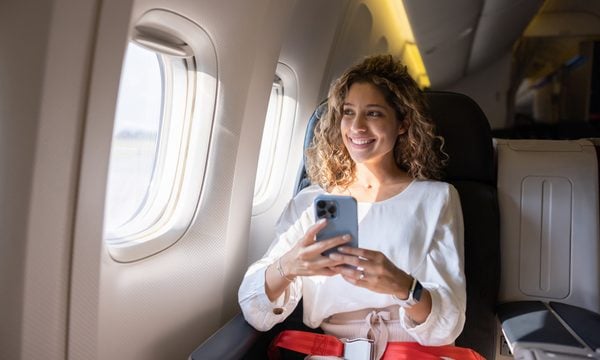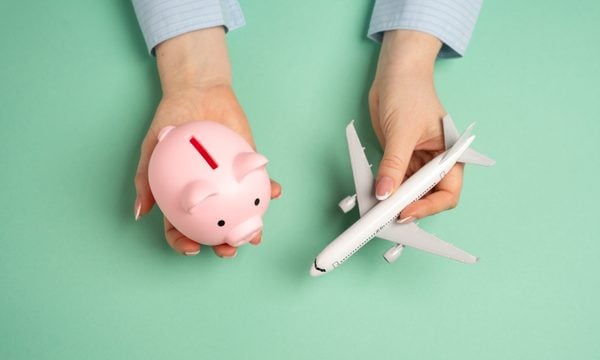What’s the Difference Between First and Business Class?
The benefits of international first class versus business class will vary by airline, aircraft and route.
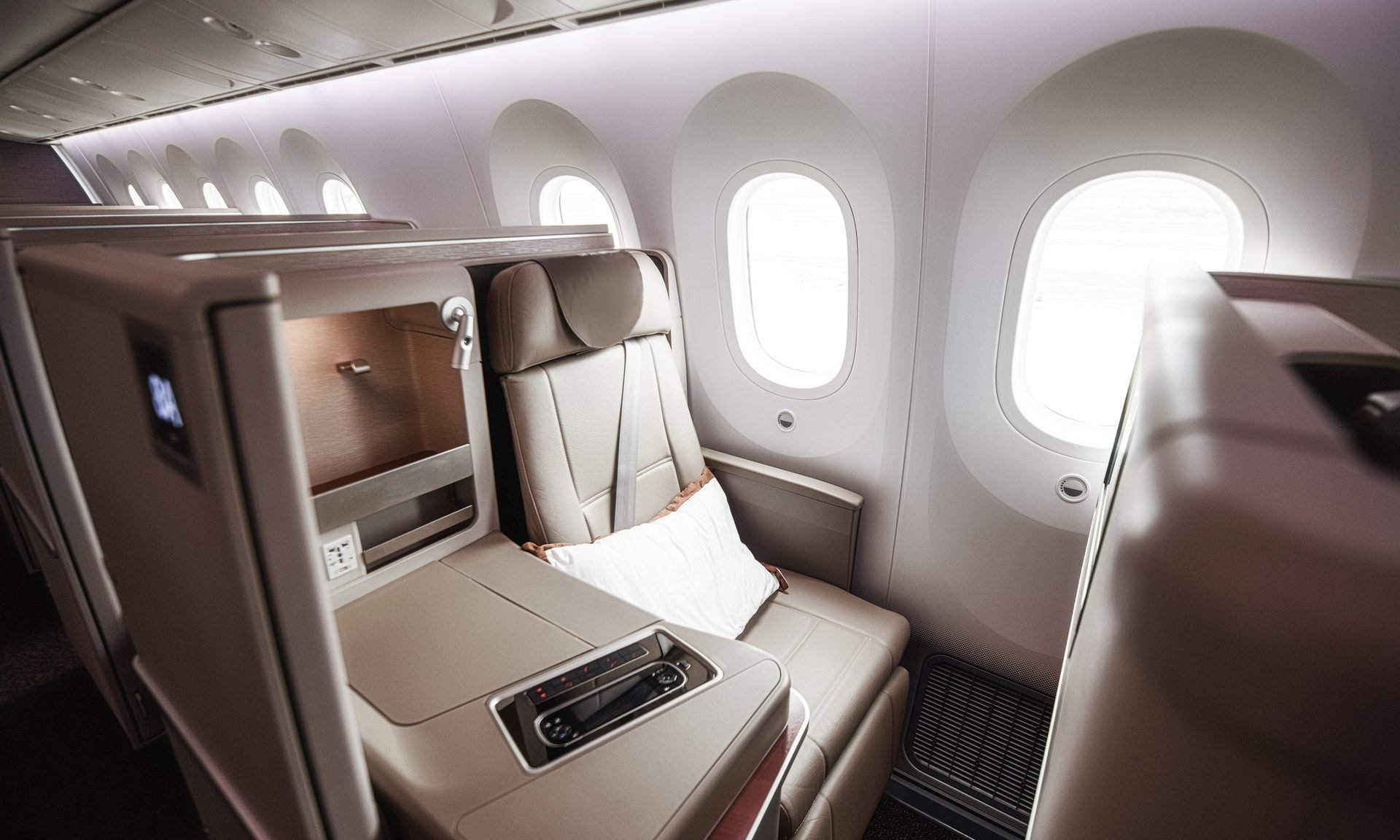
Many or all of the products on this page are from partners who compensate us when you click to or take an action on their website, but this does not influence our evaluations or ratings. Our opinions are our own.
Most U.S.-based airlines offer either first or business class for domestic flights. This "premium cabin" experience can vary significantly depending on the airline, airplane and route.
International flights typically offer both first class and business class seating. First class includes more spacious seats, better dining and alcohol options and special on-ground experiences and lounges compared to business class, though the exact benefits offered for international first and business class passengers will depend on the airline, aircraft and route.
Given that domestic and international first class and business class experiences can vary significantly, you should do your research before booking your ticket.
Get the 'Cheat Codes' to Cheaper Travel
Unlocking the secret to saving a ton on travel is easier than you think. 📤 Our free newsletter shows you how in 5 min. or less.

The basics of first class vs. business class
To understand the difference between first and business class, it’s helpful to know about the four cabins you might find on a flight:
- First class.
- Business class.
- Premium economy.
- Economy class.
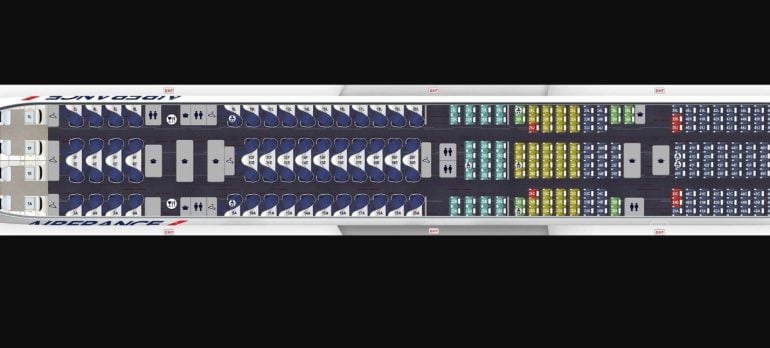
Above is an example of a four-class cabin on Air France’s Boeing 777-300, where row 1 is first class, rows 3 through 20 are business class, rows 23 through 26 are premium economy, and rows 28 and back are economy class.
An easy way to think about the difference between international first class and business class is by using the ranking of flight cabins above, from the fanciest cabin (first class) to the most basic cabin (economy class).
Generally speaking, you’ll find a four-class cabin with both first and business class only on long-haul international flights. American is the only U.S. airline to have a separate first and business class product on domestic flights; however, it’s in the process of removing its first class product and replacing it with the airline’s Flagship Suite product.
Even if airlines do offer an international first class product, they don’t typically offer it on every route. For instance, you can fly Qatar Airways first class from Doha, Qatar, to Cairo, Egypt, but the airline doesn’t currently offer a first class ticket between Los Angeles and Doha.
» Learn more: The best airline credit cards right now
Domestic first class and business class overview
Seat configuration
Most domestic flights do not offer true first class cabins. Some airlines offer a "business class" product domestically, which might be similar to first class but with a different name. Always check the specific aircraft and cabin configuration before booking.
The seat configuration on your first or business class domestic flight can vary significantly based on airline and airplane. For instance, flying American Airlines from New York-John F. Kennedy to San Francisco in business class in American’s Airbus A321 plane, you can expect a lie-flat bed with a 2-2 setup, but if you fly the same route in Alaska Airlines’ first class, you can expect a 2-2 setup with no lie-flat bed.
Note that as American offers its Flagship First Class on select transcontinental routes (think flights between New York/Miami to San Francisco/Los Angeles) operated by Airbus A321T and Boeing 777-300 aircraft, you could also book American first class for the flight above, which includes a lie-flat bed and 1-1 seating (so no need to step over your neighbor to go to the restroom).
Which airlines offer domestic first and business class products?
If you’re flying domestically within the United States, first class is the top cabin you can fly. Below is a list of the five U.S. airlines that offer a first class product for domestic flights:
- United Airlines.
- Delta Air Lines.
- American Airlines.
- Alaska Airlines.
- Hawaiian Airlines.
Only three U.S. airlines offer a business class product for domestic flights:
- American Airlines.
- JetBlue Airways.
- Delta.
Only one U.S.-based airline — American Airlines — offers a separate first and business class cabin on select flights, and the airline is phasing out its first class cabin in late 2024.
🤓 Nerdy Tip
While some U.S.-based airlines call their top-tier cabin “business class” and others call their top-tier cabin “first class,” except for American Airlines, where you’re on a flight with a separate business and first class, the name of the product doesn’t matter as much as the amenities. For instance, JetBlue’s Mint business class features a suite with a lie-flat bed, whereas Alaska’s first class features a more comfortable seat with extra legroom (but no lie-flat bed or suite). What can you expect on a domestic first class or business class flight?
Your experience on a domestic first class or business class flight can vary significantly depending on airline, airplane and route. Below is an example showing two first class flights on American between Los Angeles and Miami, with one flight featuring a lie-flat seat and the other a standard recliner.
While your experience on first and business class can vary based on airline, airplane and route, here are some common amenities that you’ll find in domestic first class and business class:
- Complimentary food and alcoholic beverages.
- More spacious and comfortable seats than economy or premium economy class.
- Priority boarding.
- Dedicated check-in counter.
- Priority baggage handling.
In general, the longer your flight, the more amenities you’re likely to get in-flight. For instance, here’s what United offers in first class based on flight distance:
- Flights less than 300 miles. Free alcoholic drinks are available upon request.
- Flights between 300 and 900 miles. Snacks and free alcoholic drinks.
- Flights over 900 miles. Mixed nuts, hot entree, dessert and free alcoholic drinks.
- Flights over 1,190 miles. Mixed nuts, hot entree, dessert, pre-arrival snack and free alcoholic drinks.
For domestic first and business class flights, the food options can vary greatly based on airline, plane and route. Given that, we recommend researching the seat, amenities and other offerings the airline has on the route and plane you’re considering flying before booking your first class or business class flight.
International first class and business class overview
Which airlines offer first and business class products for international flights?
When you’re flying internationally, some airlines offer separate first class and business class cabins on the same flight.
Below is a list of some airlines that have separate first class cabins:
- Oman Air.
- Swiss International Air Lines.
- Thai Airways.
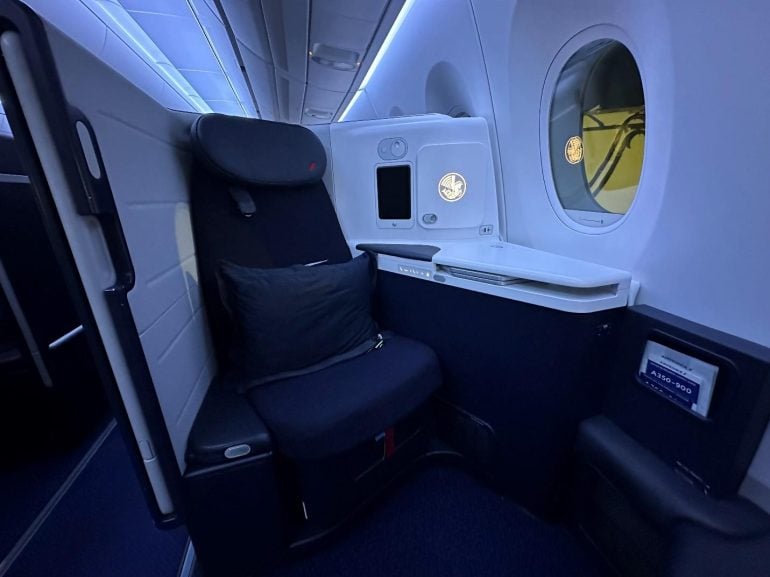
Key differences between international first class and business class
Similar to domestic flights, international business class experiences can vary greatly depending on airline, airplane and route. And while what sets international first class and business class apart will vary based on airline, plane and route, there are some basic differences between the two, with international first class offering the following:
More elevated food and alcohol options
A major benefit to flying first class is that you’ll have more sophisticated food and alcohol options on your flight. Emirates, for example, offers first class passengers caviar, dining that’s on demand (instead of a set meal service time) and Dom Pérignon — none of which are available in business class.
Smaller cabin
The first class cabin is smaller and more intimate than the business class cabin. For instance, on an Air France Boeing 777-300, there are only four first class seats compared with 58 business class seats.
Having a small cabin means you get more attention and quicker service from flight attendants, as well as a more relaxing experience since you’ll have fewer disturbances from other passengers.
More space and privacy
While the exact differences in first class versus business class seats will depend on the airline and aircraft, in general, international first class seats are more spacious and offer more privacy than their business class counterparts.
The first class seat on Japan Airlines’ A350-1000 is more than twice as wide as the business class seat on the same plane.
Better on-the-ground perks
First class passengers may get extra preflight benefits: First-class-only lounges, streamlined check-in and priority boarding are just some of the ways a first class ticket sweetens the deal.
For instance, if you fly Emirates first class through Dubai, you even get a complimentary massage in its first class lounge.
» Learn more: A beginner’s guide to flying in business or first class
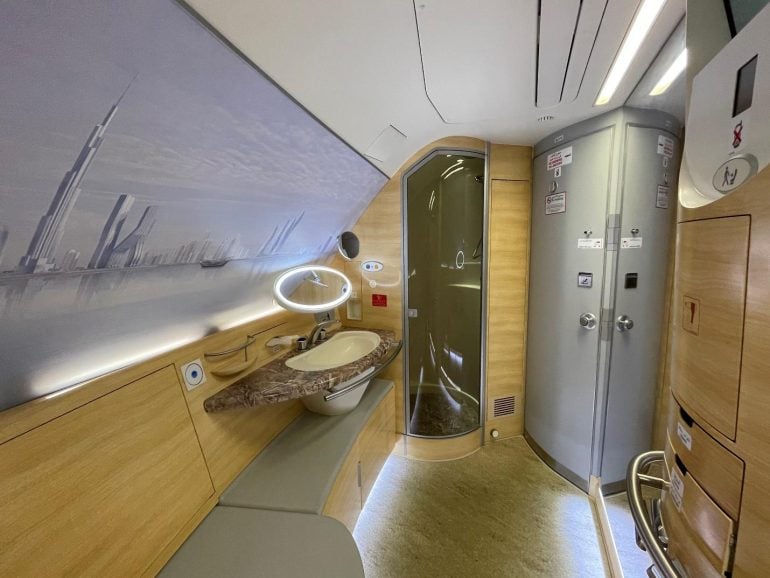
How to find a first class seat on a flight
The easiest way to find a flight with international first class is to use Google Flights and click the “First” cabin option, highlighted in blue below:
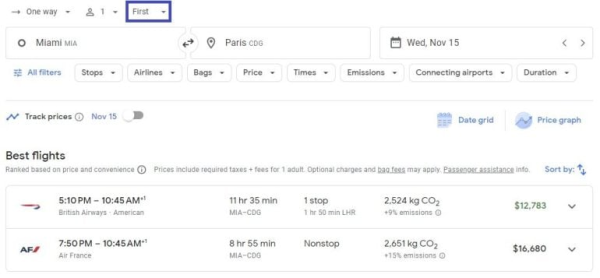
Is booking first class instead of business class worth it?
International first class can cost significantly more than business class. For instance, a one-way first class ticket between New York City and Munich on Lufthansa can cost over $15,000 compared with under $3,200 for business class.
When there’s a dramatic price difference, we generally wouldn’t recommend booking international first class over business class, unless money is no option. That said, below are some examples of times when it may be worth springing for international first class:
- If you’re able to book or upgrade to first class with points. For instance, if you’re using Alaska Airlines miles, a first class ticket can cost as little as 4,500 additional miles than a business class ticket (though the amount of miles needed for a first class ticket does ramp up significantly if you’re flying longer distances).
- When the airline offers a reasonable cash upgrade offer. Airlines will sometimes offer passengers the opportunity to upgrade to first class for less than you’d pay if you booked first class directly. We recommend checking your reservation online for upgrade options and asking the agent at check-in what the cost is for a first class upgrade.
- A special occasion, like your honeymoon or milestone birthday. If your budget allows, it may be worth splurging for a first class ticket for a special occasion.
» Learn more: Is first class worth it?
How to maximize your rewards
You want a travel credit card that prioritizes what’s important to you. Here are some of the best travel credit cards of 2026:
- Flexibility, point transfers and a large bonus: Chase Sapphire Preferred® Card
- No annual fee: Wells Fargo Autograph® Card
- Flat-rate travel rewards: Capital One Venture Rewards Credit Card
- Bonus travel rewards and high-end perks: Chase Sapphire Reserve®
- Luxury perks: American Express Platinum Card®
- Business travelers: Ink Business Preferred® Credit Card
Article sources
NerdWallet writers are subject matter authorities who use primary,
trustworthy sources to inform their work, including peer-reviewed
studies, government websites, academic research and interviews with
industry experts. All content is fact-checked for accuracy, timeliness
and relevance. You can learn more about NerdWallet's high
standards for journalism by reading our
editorial guidelines.
Limited Time Only: Earn $1,000 Toward Travel!
Capital One Venture Rewards Credit Card 
Travel

For a limited time, the
Capital One Venture Rewards Credit Card is offering new cardholders an especially rich bonus: Enjoy $250 to use on Capital One Travel in your first cardholder year, plus earn 75,000 bonus miles once you spend $4,000 on purchases within the first 3 months from account opening - that’s equal to $1,000 in travel!
More like this
Related articles




